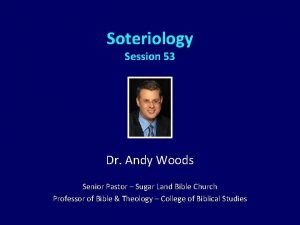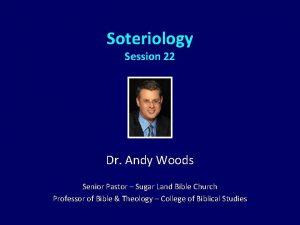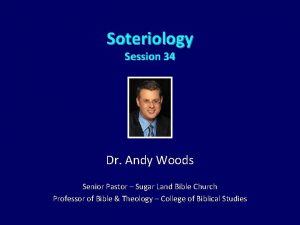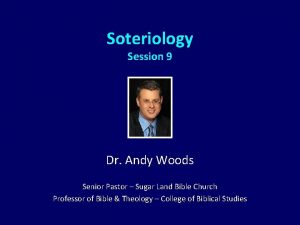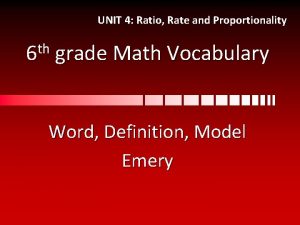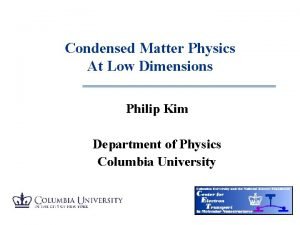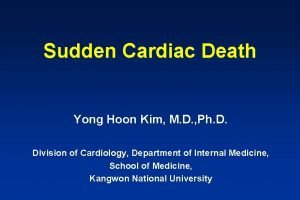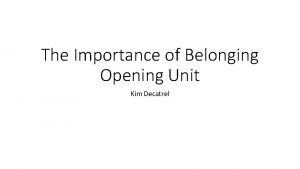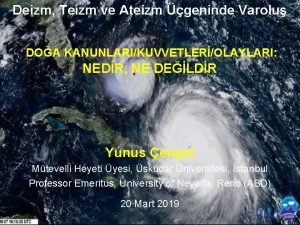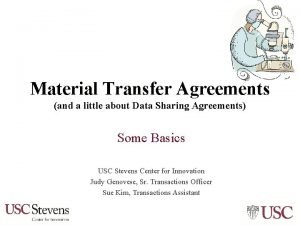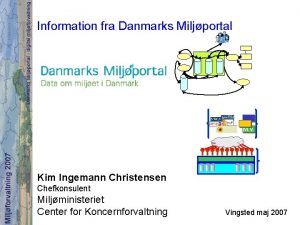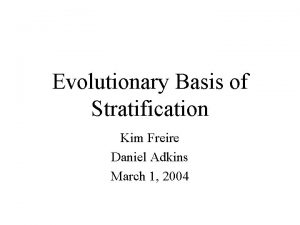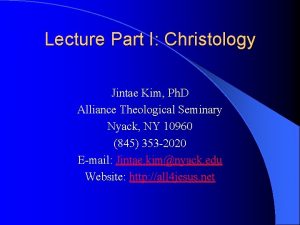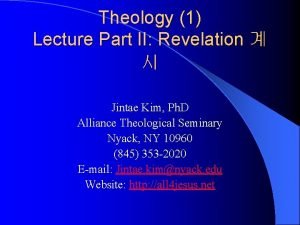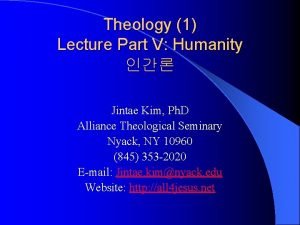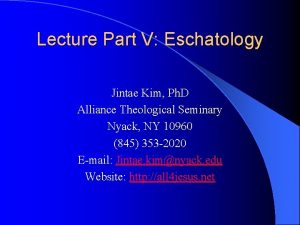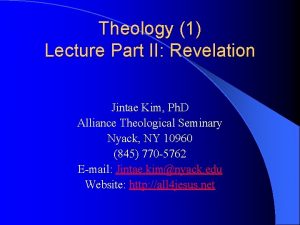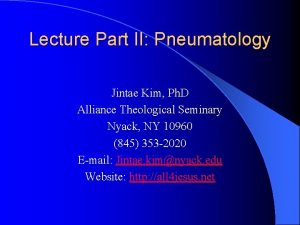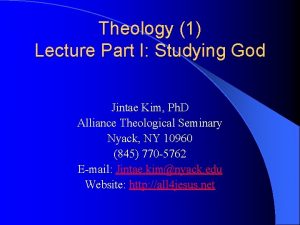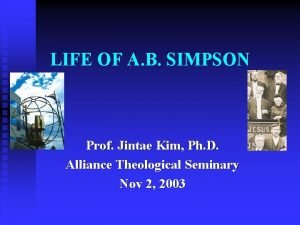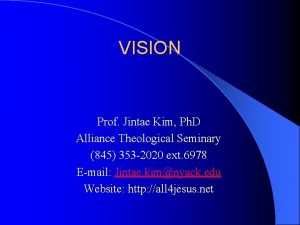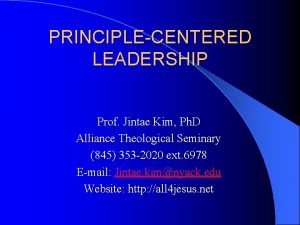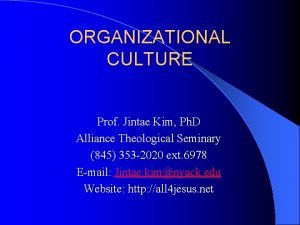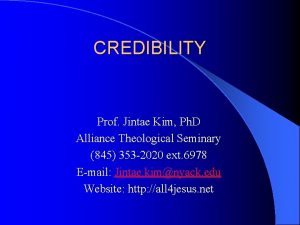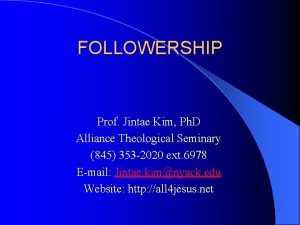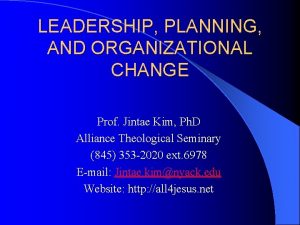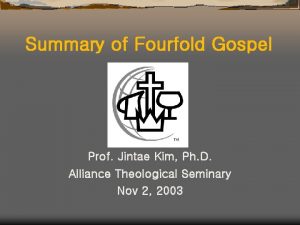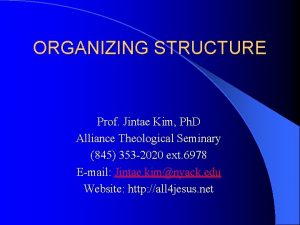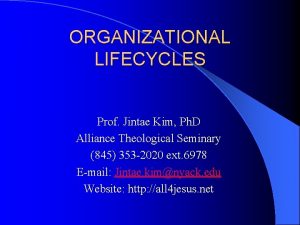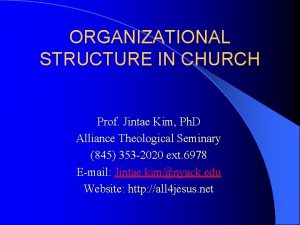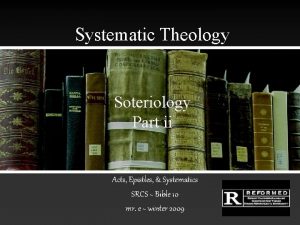Lecture Part III Soteriology Jintae Kim Ph D




















































- Slides: 52

Lecture Part III: Soteriology Jintae Kim, Ph. D Alliance Theological Seminary Nyack, NY 10960 (845) 353 -2020 E-mail: Jintae. kim@nyack. edu Website: http: //all 4 jesus. net

1. Conceptions of Salvation A. Basics l Problems l Medium l Extent B. Current Conceptions of Salvation l Liberation Theology l Existential Theology l Secular Theology l Contemporary Roman Catholic Theology l Evangelical Theology

A. Basics

What is the primary human problem? (Erickson, 280) Direction Problem Answer Vertical (Evangelical) Separation from God Restore the broken (corrupt human relationship between God nature) and man Real hope for changing society Horizontal Evil Social Environment Social gospel; Liberation Theology; Relational Theology Internal Guilt, inferiority, insecurity Growth in self-esteem, self-acceptance, selfunderstanding.

The Medium of Salvation Movement Roman-Catholicism; Lutheran Medium Opere operato: Grace to be obtained by means of a physical object (sacraments) Moral Action Social Gospel movement; Liberation Theology Evangelicalism Faith appropriates the work accomplished by Christ

The Extent of Salvation Positions Particularist Universalist Extent They see salvation as based upon individual responses to the grace of God will restore all humans to the relationship with Him for which they were originally intended.

B. Current Conceptions of Salvation

Liberation Theology (Erickson, 281 -2) Present Phenomena Problem of Society Scriptural View Kingdom Black, Feminist, Third world theologies (cf. 민중신학) Oppression and exploitation of the powerless classes by the powerful. Capitalism and bad political system. The Bible identifies with the oppressed. The redemptive history is the history of the oppressed people. In this present age

Heidegger’s Existential Philosophy (Erickson, 282) 1. Our aim should be authentic existence, that is, being what we are meant to be, living in such a way as to fulfill the potential which is ours as humans. 2. Inauthenticity: (1) Failure to exercise one’s ability to make choices and act freely; (2) Unwillingness to accept the fact that one has acted freely and is therefore responsible. 3. Authenticity involves accepting responsibility for one’s acts.

2 Tendencies of Modern Human according to Bultmann (1) Guided by a self-orientation (happiness; security; usefulness, profit) (2) Guided by a wrong hope that the real security can be obtained by their own efforts.

Bultmann’s View of Scripture (Erickson, 282) 1. He applies the distinction between the subjective knowledge and the objective knowledge (Empirical science) of Heidegger. 2. Scripture: Not the objective, but the subjective knowledge. It is written for transformation of readers by calling them away from their selfishness and from the illusory security which they has built up for themselves.

Bultmann’s View of Salvation (Erickson, 283) l Salvation is not, then, an alteration in the substance of the soul (regeneration), nor is it a forensic declaration that we are righteous in the sight of God (justification). Rather it is a fundamental alteration of our existence, our whole outlook and conduct of life.



2 Aspects of Justification in RC Objective Protestant Notion Justification Subjective Sanctification Focus On God’s active and man’s passive aspects On man’s active aspect


2. Antecedent to Salvation: Predestination

Antecedents to Salvation: 4 Terms Foreordination (선작정) Predestination (예정) Election (택정) Reprobation (유기) Definition 모든 일에 대하여 미리 세워진 하 나님의 뜻 인간의 구원과 멸망에 대하여 세 우신 하나님의 뜻 영생을 받는 구원받을 자의 택정 (Positive side of Predestination) 구원받지 못할 자의 택정 (Negative side of Predestination)

Historical Development of Predestination 1. Debate: Augustine vs. Pelagius 2. Semi-Pelagianism: AD 431 Ephesus. 3. Anselm & Aquinas: Augustinian. 11’th – 13’th c. 4. Duns Scotus – 14’th c. Predestination by “foreknowledge” (예지예정) – Pelagian. 5. Debate: Luther (Augustinian) vs. Erasmus (Free will). John Calvin. 6. J. Arminius: 16’th-17’th c. Semi-Pelagianism. 예 지예정. 7. John Wesley: 18’th c. “Prevenient grace” 선행적 은총. 알미니안 주의를 일반화시킴.


Calvinism vs Arminianism (5 Points) Calvinism Arminianism Lostness of Total Inability (or Free will or Human depravity) ability Election Unconditional Conditional Atonement Limited General Grace Irresistible Resistible Falling Perseverance of Saints Falling from Grace possible

5 Characteristics of Election according to Calvinism 1. An expression of the sovereign will of God and good pleasure of God. 하나님의 절대 주권적인 뜻이며 선한 표현. 2. Efficacious. 절대적인 효력. 3. From all eternity. 영원전부터 이미 이루 어짐. 4. Unconditional. 무조건적. 5. Immutable. 불변적.





Implications of Predestination 1. We can have confidence that what God has decided will come to pass. 2. We need not criticize ourselves when some people reject Christ. 3. Predestination does not nullify incentive for evangelism and missions. 4. Grace is absolutely necessary.


3. Beginning of Salvation: Subjective Aspects

Ordo Salutis (Order of Salvation) 1. Antecedents: Election 택정 Effectual Calling 유효한 부르심 2. Beginning: (1) Objective: Union with Christ; Justification 칭 의 Adoption 양자됨 (2) Subjective: Conversion 회심; Regeneration 중생 3. Continuation: Sanctification 성화 4. Perseverance 견인 5. Glorification영화

Effectual Calling: Definition 1. It is God’s special work with the elect, enabling them to respond in repentance and faith, and rendering it certain that they will (Erickson, 295). 2. It involves the general calling of God in the Gospel made effective in an individual as he or she believes the Gospel and accepts Christ as Savior and Lord. It is given only to all of the elect, and since it is effectual and irrevocable, it necessarily results in salvation and is logically prior to conversion and necessarily leads to it (House, 102).



Conversion and Regeneration (Erickson, 301) l Conversion refers to l Regeneration is God’s our response in transformation of repentance (negative) individual believers, and faith (positive) to his giving a new God’s offer of spiritual vitality and salvation and approach direction to their lives to humankind. when they accepts Christ.




4. The Beginning of Salvation: Objective Aspects (1) Union with Christ 그리스도와의 연합 (2 Cor 5: 17; Eph 1: 3 -6; Col 1: 27; 2: 20; Gal 2: 20; Rom 6: 3 -5) (2) Justification 칭의 (3) Adoption 양자됨




Justification 1. Definition: It is God’s action pronouncing sinners righteous in his sight; it is a forensic act imputing the righteousness of Christ to the believer on the basis of the sufficiency of Christ’s atoning death (Erickson, 306). 2. While it is faith that leads to justification, justification must and will inevitably produce good woks (Erickson, 309).

5. Continuation and Completion of Salvation l Sanctification l Perseverance l Glorification

Justification vs. Sanctification Justification Sanctification Duration Instantaneous Process Quantita- Either justified or tive not More or less sanctified Qualitative Actual transformation Forensic or declarative Character Objective work Subjective work affecting our inner standing before God person


Characteristics of Sanctification (Erickson, 314 -5) 1. Supernatural (1 Thes 5: 23). 초자연적인 하나님의 역사. 개혁이 아니다. 2. Progressive (Phil 1: 6). 점진적인 역사. 3. Conforming to Christ himself (Rom 8: 29). 궁극적 인 목표는 그리스도이다. 4. The work of the Holy Spirit (Gal 5: 16, 22 -25). 성 령의 역사 5. Role for the believer (Phil 2: 12). 성도의 능동적 역할을 요구한다.






Present Body vs Resurrection Body (Erickson, 324; 1 Cor 15: 38 -52) 현재의 몸 부활의 몸 Perishable (썩어질 몸): Incorruptible (썩지 않는 몸): 질병과 썩음에서 자 질병과 죽음 유 Sown in dishonor Glorious (욕된 몸) (영광스러운 몸) Weak (약한 몸) Powerful (강한 몸) Physical (육적인 몸) Spiritual (영적인 몸)
 Andy woods soteriology
Andy woods soteriology Andy woods soteriology
Andy woods soteriology Andy woods pastor wikipedia
Andy woods pastor wikipedia Andy woods pastor wikipedia
Andy woods pastor wikipedia Hamlet act iii scene ii
Hamlet act iii scene ii 01:640:244 lecture notes - lecture 15: plat, idah, farad
01:640:244 lecture notes - lecture 15: plat, idah, farad Va professional standards board
Va professional standards board The phase of the moon you see depends on ______.
The phase of the moon you see depends on ______. Brainpop ratios
Brainpop ratios Part to part variation
Part to part variation Technical descriptions
Technical descriptions Part whole model subtraction
Part whole model subtraction Parts of the under bar
Parts of the under bar Unit ratio definition
Unit ratio definition Philip kim graphene
Philip kim graphene Kim van ekris
Kim van ekris Kim klaiman
Kim klaiman Kim reeder
Kim reeder Dissected heart
Dissected heart Grecki filozof i matematyk z wyspy samos
Grecki filozof i matematyk z wyspy samos Kim topqir
Kim topqir Kim penman
Kim penman Kim
Kim Kim były syreny
Kim były syreny Chan kim srun
Chan kim srun Dr kimberly barker
Dr kimberly barker Kim's game questions
Kim's game questions External rotation lag sign
External rotation lag sign Doa evren kim
Doa evren kim Junni kim
Junni kim Kim hazelwood
Kim hazelwood Göktürk kitabeleri hakkında bilgi
Göktürk kitabeleri hakkında bilgi Kim rodriguez age
Kim rodriguez age Kim gretzky
Kim gretzky Dr kim forrester
Dr kim forrester Kim foglia
Kim foglia Kim był święty piotr
Kim był święty piotr Kim ebensgaard jensen
Kim ebensgaard jensen Gel kim
Gel kim Scamper tekniğini kim icat etti
Scamper tekniğini kim icat etti Jestem dzieckiem boga
Jestem dzieckiem boga Belgesiz zamir
Belgesiz zamir Sue kim usc
Sue kim usc Kim ingemann
Kim ingemann Chan kim blue ocean strategy
Chan kim blue ocean strategy Sebastian bryła
Sebastian bryła Korean consonants and vowels
Korean consonants and vowels Kim był wincenty witos
Kim był wincenty witos Kim holland sec
Kim holland sec Jutlandia melodi
Jutlandia melodi Chung kim wah
Chung kim wah Rethinking teacher supervision and evaluation
Rethinking teacher supervision and evaluation Kim freire
Kim freire
